Deadly measles outbreak does little to counter vaccine scepticism in Texas
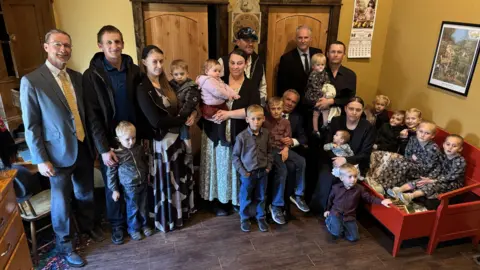 Health Secretary Robert Kennedy
Health Secretary Robert KennedyOn an unusually crisp April day in a rural Texas town, dozens of Mennonite community members gathered alongside the nation's top health official, Robert F Kennedy Jr, to mourn the death of an eight-year-old.
Daisy Hildebrand is the second unvaccinated girl from the community to die from measles in two months.
Officials in Seminole town also joined the reception after her funeral to support the family, said South Plains Public Health Director Zach Holbrooks. This time, there was no talk of the vaccine that prevents measles deaths - unlike many of his long days since the outbreak began.
"The focus was on their healing," Mr Holbrooks said. "You never want to see anybody pass away, especially a child that young, from any kind of illness, because there is a prevention for it - the MMR vaccine."
Like other Seminole natives, Mr Holbrooks was not vaccinated against measles as a child. He got a shot in college, and another in February, when his hometown became the epicentre of one of the country's worst measles outbreaks in a decade.
The US has seen more than 700 cases this year, a sharp rise on the 285 cases reported in 2024. The majority of infections - 541 as of Friday - occurred in western Texas, with 56 patients sent to the hospital.
Cases in New Mexico, Oklahoma and Kansas also are linked to the outbreak. Two children, including Daisy, have died - the first recorded fatalities from measles in the US since 2015.
It's not slowing down either, public health experts say. They try to reach vaccine-hesitant residents, but struggle with those who carry on with daily life as usual, alongside mixed messaging from federal officials, including Kennedy, who has endorsed immunisation conspiracy theories in the past.
"I wish there were more coming in to get the vaccine," Mr Holbrooks said. "We can put messaging out, but it's up to them to come see us."
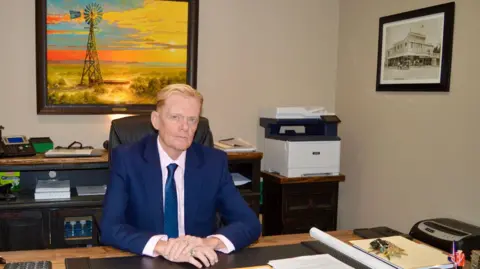
'Going about' life in a measles epicentre
The western Texas town of Seminole - population 7,000 - is bordered by miles of rural farmland and oil fields.
Among billboards for restaurants, gun silencers and tractors, a digital sign hints at the crisis gripping the community: a warning about the dangers of measles, which can cause complications including pneumonia, brain swelling and death.
It has spread rapidly among Mennonites, a religious community living near Seminole. Mr Holbrooks estimates the population could be as many as 40,000 across several counties. In those areas, public school vaccination rates are as low as 82%.
Roughly 95% of a community must be vaccinated against the measles to achieve herd immunity - when enough of a group is immune to a disease that its spread is limited and the unvaccinated are protected.
Mr Holbrooks remembers when the Low German Mennonite group began migrating to his hometown and nearby states in the 1970s. The religion has no specific doctrines against vaccinations, but they tend to avoid many modern aspects of life, including the health care system.
Their community is not alone. At least 118,000 kindergarteners in Texas are exempt from one or more vaccines, mostly in rural areas, according to Terri Burke, director of Texas vaccine advocacy group the Immunization Partnership. Parents can get a waiver to exempt their child from school vaccine requirements for a variety of reasons, including religion.
Savannah Knelsen, an 18-year-old server at a Seminole barbecue restaurant, has not been vaccinated against measles - or anything else.
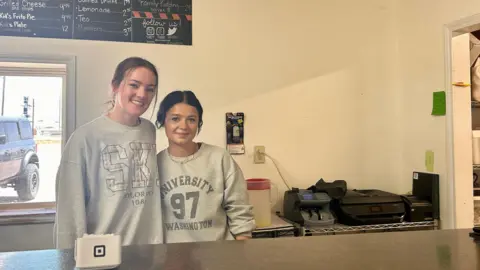
Many of her family members and friends - also unvaccinated - caught the measles in recent weeks. One relative developed a fever of 104.5F (40.2C), but still chose not to go to the hospital.
The recent deaths of two children have not convinced her to get vaccinated, she said, adding that she was healthy and wanted to let her body "fight off" infections. Experts agree the vaccine is the best way to prevent infections - including severe ones.
Ms Knelsen's 19-year-old co-worker, Jessica Giesbrecht, along with her family, has been vaccinated against the measles.
"I'm worried for my baby niece," Ms Giesbrecht said, adding that she was too young to be vaccinated.
Still, the two said the outbreak doesn't weigh heavily on daily life. Others in Seminole agree.
A cashier at a local pharmacy said no one has stopped by for measles vaccinations since the outbreak started. "People are just going about their lives," she said.
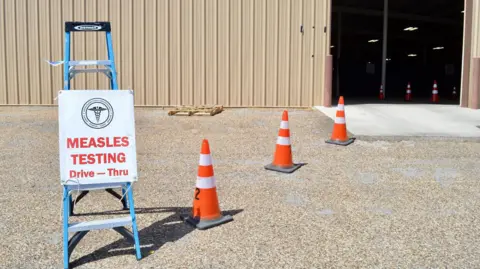
Kennedy tries to 'cover middle ground'
On Sunday, Kennedy made his first trip to the region since the outbreak to attend the eight-year-old girl's funeral.
The top US health official is an unlikely figure to spearhead the fight against measles - having in the past endorsed conspiracy theories about immunisation, including debunked claims about links to autism. He downplayed the outbreak in western Texas at first, calling it "not unusual".
Trump echoed these remarks last weekend, saying that only a "fairly small number of people" had been impacted, when he was asked about it by the BBC aboard Air Force One. It was "not something new", he added.
On Wednesday, Kennedy gave his strongest statement yet in support of the measles vaccine, telling the BBC's US partner CBS News: "The federal government's position, my position, is that people should get the measles vaccine."
The remarks were met with social media backlash from some anti-vaccine supporters. Kennedy added, however, that the government "should not be mandating" vaccines.
The influence of some of his earlier remarks lingers.
In one of several Mennonite-owned natural-health stores in Seminole, dozens of bottles of cod liver oil - a supplement that contains vitamin A - are on display. Alongside the vaccine, Kennedy has promoted vitamin A as an alternative measles treatment, a remedy doctors say should not be given without guidance from a physician and is no substitute for the vaccine.
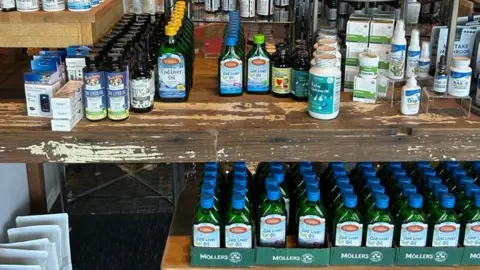
The treatment has at times proven dangerous. Covenant Children's Hospital in nearby Lubbock told the BBC it has treated several unvaccinated children with measles for vitamin A toxicity - some had attempted to use it as a preventative measure.
The community needs federal officials to provide stronger messaging to help convince people to get vaccinated and slow the outbreak, said Gordon Mattimoe, director of the health department in nearby Andrews County.
"People look to their leaders to lead," he said.
Jeff Hutt, a former spokesperson for the Make America Healthy Again political action committee and Kennedy's former national field director, argued that the health secretary had to "cover the middle ground", providing statements that are "politically adequate" while also providing sceptical stances on vaccines.
"In covering the middle ground, I'm not necessarily sure he was able to reassure folks that he had a handle on [measles], or that he was able to reassure folks that he was sticking to his guns," Mr Hutt said.
Slashing funds in an outbreak zone
The Trump administration's health policies could have other consequences in Texas, officials say. Local health departments are at risk of losing critical resources because of attempts to cut $11.4bn (£8.8bn) in public health grants. The move was temporarily blocked by a judge last week.
Mr Mattimoe said that because of the potential cuts - around $250,000 in grant funding for his health department - he is not able to hire a new nurse to give immunisations.
In a statement to the BBC, the US Department of Health and Human Services said it had deployed the "necessary" resources from the US Centers for Disease Control and Prevention (CDC) to respond to the outbreak.
"The CDC is in close, constant communication with local and state health officials on the ground to ensure they have what they need," the official said.
The Texas Department of Health Services could lose as much as $550m in grant funding. It has provided staff, vaccines, testing and other support to local health departments, but likely will need extra funding, spokesman Chris Van Deusen told the BBC.
Mr Mattimoe contacted lawmakers and the state for help, but is not hopeful.
"I don't think they have the funds," he said.
'Trusted messengers'
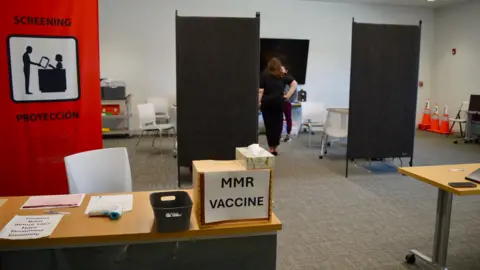
In nearby Lubbock, Texas, just two days after the news of Daisy's death, all was quiet at the health department's vaccination clinic.
Other days had been busier, with as many as 20 people coming in for vaccines, said Katherine Wells, director of public health for the city, where hospitals receive children with severe measles cases from more rural counties.
Since the outbreak began in January, the city of Seminole has vaccinated 103 adults and 143 children against the measles, Mr Holbrooks said. The neighbouring three rural counties decided to close their underused vaccine clinics and send more staff to hard-hit Seminole.
"There's always talk on, what else can we do, and are we doing enough?" Mr Holbrooks said. "We want to build trust, not tear it down."
At times, local health officials have seen progress.
A Mennonite doctor in Andrews County gained community members' trust and encouraged them to get vaccinated, said Mr Mattimoe.
"Those trusted messengers in those communities - I think [they're] very important," he said.
Ms Wells hopes vaccinations will start to pick up after the latest measles death and the city's new guidance to vaccinate children as young as six months, instead of one year.
The bigger city saw an outbreak at a daycare, among children too young to be fully vaccinated, a situation she believes will be helped by the earlier shots.
But "there's always going to be some people that we don't reach", Ms Wells said.
That means the virus is likely to circulate for a while in western Texas regions where people are unvaccinated, officials said.
"We're just at the beginning of it," Mr Mattimoe said. "It's going to have to run through the community. Until they get that natural immunity, it'll just keep running its course."
